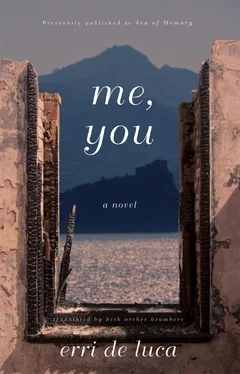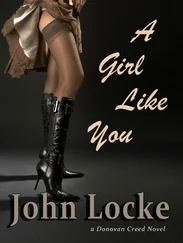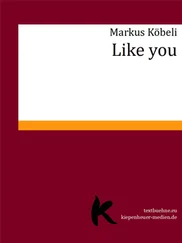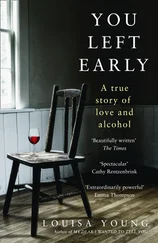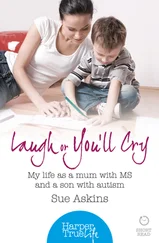There was a festival on the island that day, it was Caia’s last evening. We were to go to the fair together and walk around the stands.

First I went to the fishermen’s beach. Nicola was getting the boat ready for the next night. For him there were no holidays, he would rest during the winter when there are days the sea doesn’t want anybody on its surface. I gave him a hand. The other fishermen were already at the fair in their clean shirts, their only holiday attire. Nicola felt like talking to me, selecting words from both Neapolitan dialect and Italian.
“You’re growing up. In one summer you’ve become a man. I heard on the boat that Daniele’s fists were flying. Were you there too?” Yes, I said. “It’s good to stand up for yourself, not let yourself be insulted. I can’t hit anybody. As a boy, yes, but not since the war.” I asked him if he had ever had enemies.
“I was in a place where the enemy was us. We were the enemies of a people who had done nothing to us and we were armed to occupy their territory. We were allies of the Germans against those people and we were wrong to be there. I was ashamed to make war against those people. When it was over and we lost, my shame disappeared all at once. My allies were that family who received me and hid me, bless them wherever they may be. I understood nothing about enemies.”
But at that time he had enemies, didn’t he? Didn’t he wish them dead?
“When the Germans began losing, I saw them run away and die, and when I saw the slain body of an enemy, it was no longer an enemy. It wasn’t anything. When we are corpses we are all alike. Even enemies die crying for help. They too burst open when they’re shot, and the hatred, if you really had it inside of you, is no longer there. I saw dead enemies and I felt nothing. There are no enemies, it’s all a mistake and you realize that once they’re dead.”
His voice was calm. I was flattered by his confidences. I was calm too, carefully weighing the words that came out of my mouth. The choice of fire had settled my nerves.
Nicola had seen enemies die and on seeing them had discovered that his body was emptied of hate. I understood that he had arrived at some conclusion, but he could not pass it on to me. His experience was not enough, was not able to save me from my own, or avert it. It was not for me to contradict him with arguments or attribute to him enemies he had known before me and better, people who had participated in the massacres of defenseless victims and who continued to enjoy their vacations in good health and without consequences. That was my conclusion, my premise. He continued to be tormented by the consequences. His words could tell me in advance how I would feel afterward, but they could not stop me.
I had wanted to break open Caia’s secret; it had taken complete hold of me. I had taken her mourning as my banner. I had covered all the stations of love, from a kid with a crush on an older girl to a father who returned to protect her. From that fantasy of Caia’s about her tateh , I realized that was how I really felt: like a father who comes back to find his daughter after many years, an emigrant who can once again embrace his child. Among the similarities she kept discovering between her father and me, the only one I shared was that particular emotion of a diffuse, mature love, now somber with anger.

In the sky the rockets of the saints were exploding. An uncontrollable reflex made Nicola lower his head. He quickly raised it again but at the next explosion ducked once more. I kept my head up, knowing nothing about gunfire or how one feels under the real thing. My anger looked on the pyrotechnic artillery of the festival as a good omen. My anger was arrogant compared with the recoil from the blasts that bent Nicola’s neck, his physical memory of attempts against his youth exposed to a bomb-filled sky.
“They were not like us, each one of them saw himself as part of a larger body. They were proud of that body. They obeyed the way a finger obeys the brain. They were no longer men as we understand them but men like replacement parts. They only felt right in uniform. They called prisoners pieces when they counted them. All other peoples were inferior to them, including us Italians. We were under their orders, but there were some awful things they couldn’t make us do. We remained men, soldiers by force who couldn’t wait to take off their uniform, stop fighting, return to work. I kept thinking about the fishnet that had cost me a year’s work and was still new. And I ached with jealousy to think that someone else might use it, that my wife might sell it in order to eat. She didn’t. During my hours off duty I fished in the river with a rod. I suffered so much heartache then, that ever since I never wanted to use a rod again. I used to bring my catch to my adoptive family, bless them wherever they are.”
He was eager to explain himself and searched for expressions in Italian that he translated from Neapolitan. He shook his head from the strain. I was receiving a legacy of words that I stored in the jumble of my thoughts and in the confusion of my desperate need to reply.
To change the subject I asked him if he was going to the festival. I would be going later with Daniele.
“Me too, later, I’m taking the family.”

Those of the group still remaining on the island had made a date to meet and pushed into the festival as a tight unit. All the inhabitants came to stroll through the few streets. It was early evening; the lanterns strung along the way made the sky pale. Caia held my arm and complimented my clean shirt. “I have shoes on too,” I said, mockingly showing off my sandals. I saw that chipped piece of tooth emerge, making her smile all the broader.
The crowd broke up our group. The two of us clutched each other’s arms to avoid being separated. Caia asked me to buy her a cone of cotton candy. To be heard over the clamor, she raised her voice in a child’s squeal. She grasped the cone, plunged her face into it, and finished it in a flash. I removed the little granules of sugar stuck to her cheeks. She was joyful the way one is when a childish mood comes over a grown person, when a child’s wriggle takes hold of the feet, making them want to scamper about. She pulled my arms, trying to run right into the mob. I pretended to struggle, to be panting for air, and wiped the palm of my right hand across my temples all the way to the back of my neck. At one point, she shook her head and whispered in my ear, “ Tateh , I know you’re here, there’s no need for any more signs.”
Her game with me struck me funny and brought forth a throaty laugh I had never heard from myself before. It was warm, slow, and came in short bursts. I felt it deep inside, heavy, filled with affection for my little Chaiele in the midst of the festival. She heard my laughter and instantly leaned her head against my shoulder. Above us the explosions started up again, no louder than champagne bottles uncorked in the sky.
She tried the shooting gallery, firing a compressed air gun at balls in a cage. Then she wanted a little doll no bigger than her hand, and I remembered to buy a cork for the demijohn. We came across Nicola and his family. I greeted him from a distance, but he didn’t notice me. Then we ran into my father, who in his distraction and without his glasses greeted only Caia. She laughed because not even my father recognized me. I was transformed and no one knew who I was.
“Tonight only I know who you are at this festival.”
Читать дальше
